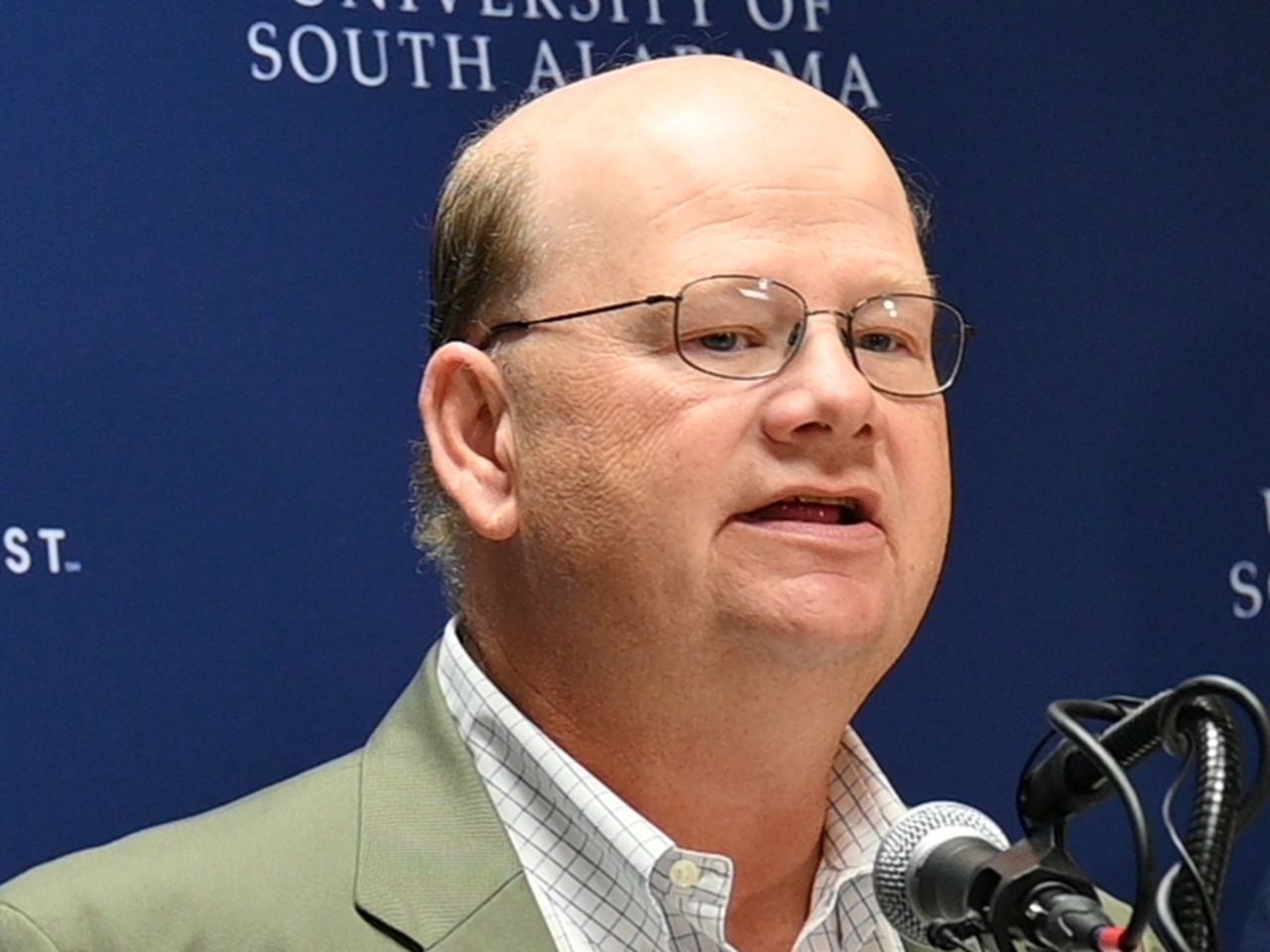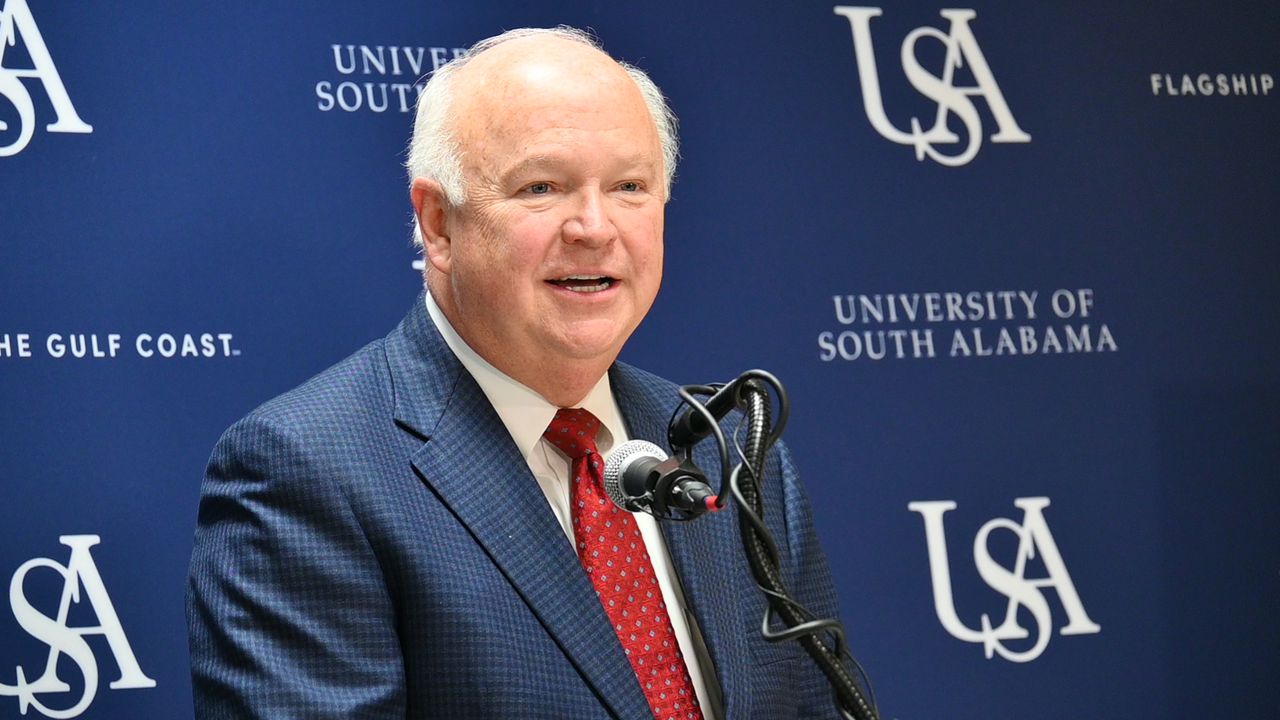USA Foundation donates $1.9 million in beach property to University
For over 30 years, the University of South Alabama Foundation has owned 63 acres of Dauphin Island property that included a sandy beachfront along Aloe Bay.
As of August, the property valued at $1.9 million is now part of the University of South Alabama’s portfolio.
And for some of the students who are part of the growing Stokes School of Marine and Environmental Sciences, it will soon mean more visits to the beach.
“Some of the students are already calling it Jaguar Beach,” said Sean Powers, director of the Stokes School. “They have plans that don’t necessarily agree with ours. But it’s an amazing place for students to drag kayaks, paddleboats, and all other things and to enjoy the environment and develop that appreciation.”
The USA Foundation’s gift to the university was officially announced on Wednesday during a news conference inside the administration’s building. The property transaction officially occurred on August 24, and Powers said classes are already preparing to utilize the property for lab and research activities.
Jo Bonner, president of the University of South Alabama, speaks during a news conference on Wednesday, September 6, 2023, at the university’s administrative building in Mobile, Ala. (John Sharp/[email protected]).
“It’s going to have an immediate impact on our ability to teach our students,” said University of South Alabama President Jo Bonner. “It’s really a gift that ties into the mission of the university, with our role in serving the community doing research and in teaching.”
Maxey Roberts, director of the USA Foundation, said the transaction’s timing aligns with supporting the Stoke School’s mission and the Town of Dauphin Island, which is looking to generate environmental and economic activity within the area surrounding Aloe Bay.
The Bay is in the heart of Dauphin Island, and has long been a site for commercial fishing and tourism activity. It’s also home to the annual Alabama Deep Sea Fishing Rodeo.
“We saw this as the perfect time to convey the property to the university to allow the university to continue with the use of that property,” she said.
Said Powers, “It signifies our program is on the move.”
Indeed, the school launched Bachelor of Science degrees in marine sciences and environmental and sustainability sciences this year with initial projections of about 40 students enrolled by the second year.

Sean Powers, director of the Stokes School of Marine and Environmental Sciences at the University of South Alabama, speaks during a news conference on Wednesday, September 6, 2023, at the university’s administrative building in Mobile, Ala. (John Sharp/[email protected]).
Powers said that 205 students have signed up. The school’s graduate program has increased its enrollment from 60 to 90. And the number of faculty is on the rise – from 10 a few years ago to 14 this year, and with plans to add two more.
“I think more and more people are recognizing that South Alabama is a place to study marine environmental sciences,” Powers said.
The better-than-expected enrollment coincides with investments into the school. Approximately six months ago, Dr. Steven Stokes and his wife, Angela, donated $2 million to the School which led to the University’s board of trustees to name it after them. In total, the Stokes family has contributed over $6.8 million to the university.
The gift also comes at a time that Dauphin Island officials are moving forward with a total of $25 million in grant projects to preserve the Aloe Bay shoreline adjacent to the Dauphin Island Bridge.
The town intends to dredge the Aloe Bay Channel and utilize the dredged materials to extend the beach area of the property 150 feet into the bay. The work is aimed at restoring the beach back to its historical shoreline.

Dauphin Island Mayor Jeff Collier speaks during a news conference on Wednesday, September 6, 2023, at the university’s administrative building in Mobile, Ala. (John Sharp/[email protected]).
Dauphin Island Mayor Jeff Collier said the property transaction allows for a restoration of the area for “future generations” while enhancing the town’s environmental research stewardship and education. The Dauphin Island Sea Lab is also expected to utilize the land for its research projects.
The overall Aloe Bay project is being supported through grants that were made available after the 2010 Deepwater Horizon disaster and oil spill.
“We’re a barrier island and we recognize that the environment is crucial to our success going forward,” Collier said. “We know preservation and restoration are key opportunities to take advantage of while funding is available.”
Powers said the property – a majority of which is submerged land – will allow students access to oyster farming and aquaculture husbandry, among other things. Officials called the property a “living laboratory” for the school.
He said the university is hoping to build a pavilion and restrooms on the property, but not much else.
“Most of our labs are four hours,” said Powers. “It’s enough time to spend two hours out there and to get them back to their next class.”
Dauphin Island’s Aloe Bay is approximately 35 miles south of USA’s campus in west Mobile.
